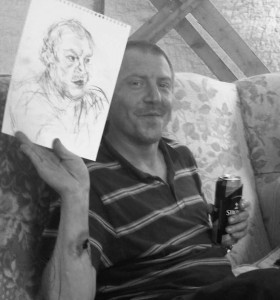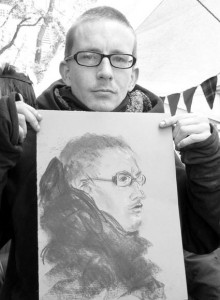First post in this series on Finsbury Square here.
The court heard how bylaws on structures and placards had been breached. There were also reports of the smell of urine, fires having been lit, crime increasing by 85% and other antisocial behaviour. It was hearsay, and the judge conceded as much, but none of the occupiers would deny that things had been challenging (unless, of course, they were in a court of law). There can’t be much crime normally in a completely non-residential part of the business district, so perhaps the extent of the increase is misleading, and the council didn’t help much with the toilet situation, but the problems were sometimes acute. The city can be a desperate place.
A community has to regulate itself somehow. A political movement need not.
Islington council tolerated the Finsbury Square camp for longer than all but the most dedicated occupiers. Funding dropped to basic survival. The website hasn’t been updated since March. Its political impact nosedived. The defendants didn’t have a lawyer to speak for them in court, nor a leg to stand on in the media and political arenas.
FS was, however, everything that Occupy was about, boiling away in a pressure cooker in the heart of London. In our economic system, money equals value. Values you can’t monetorize are not rewarded, and Thatcher’s pronouncement, that there is no such thing as society, turns out to be a grim prediction. This is the end, not the beginning, of the ruthless politics of competition and consumption, of capitalism without a heart.
Council for the claimant used the testimonies submitted by sympathisers against the defendants, as evidence of the problems in the camp. It would have been dishonest to write a statement without mentioning them. My statement was the following:
 Finsbury Square grew out of Occupy London as an experiment in alternative living. As it developed, a place of refuge and hope in the extreme conditions of London in the grip of austerity, people from all walks of life were made welcome. Vegetables were planted and a library opened, with literature, talks by professors, encouraging Londoners to think about how society can be more fair.
Finsbury Square grew out of Occupy London as an experiment in alternative living. As it developed, a place of refuge and hope in the extreme conditions of London in the grip of austerity, people from all walks of life were made welcome. Vegetables were planted and a library opened, with literature, talks by professors, encouraging Londoners to think about how society can be more fair.
People from all over England visited to educate themselves and exchange ideas and friendship with students and academics, passers-by, financial workers on their lunch breaks, urban gardeners, the homeless and others. Vulnerable people (including people just like you and me in the throes of misfortune or tragedy) made a community in the open, rather than seeking anonymity in the shadows of society. They faced all the problems that entails. It has not been plain sailing, but they have supported and regulated each other to a degree, and been helped by passionate and compassionate people committed to the ideals of justice.
The financial chaos unleashed by the crash cost hundreds of thousands of Londoners their jobs. Families scrape by in temporary accommodation, whilst the top echelon of society sits comfortably, entirely insulated from the effects of austerity, accumulating capital and power. Tens of thousands are homeless, suffering all that entails, despite enough empty properties to house them. London’s problems will not go away with an eviction. As people disenfranchised by yawning inequality seek security and community, makeshift camps will arise, either integrated by local councils or marginalized at the cracks of society and pushed into desperation.
The vegetable garden planted at Finsbury is bearing fruit.
Would it not be wiser to work with the inhabitants rather than against them?






1 Comment